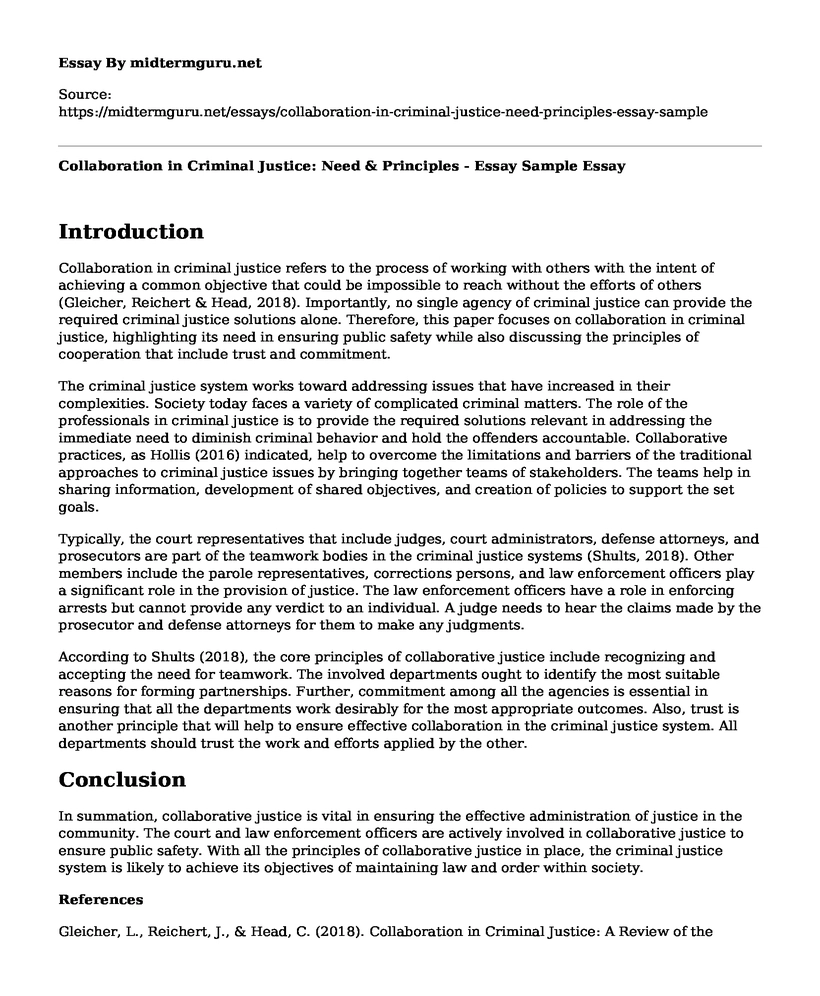Introduction
Collaboration in criminal justice refers to the process of working with others with the intent of achieving a common objective that could be impossible to reach without the efforts of others (Gleicher, Reichert & Head, 2018). Importantly, no single agency of criminal justice can provide the required criminal justice solutions alone. Therefore, this paper focuses on collaboration in criminal justice, highlighting its need in ensuring public safety while also discussing the principles of cooperation that include trust and commitment.
The criminal justice system works toward addressing issues that have increased in their complexities. Society today faces a variety of complicated criminal matters. The role of the professionals in criminal justice is to provide the required solutions relevant in addressing the immediate need to diminish criminal behavior and hold the offenders accountable. Collaborative practices, as Hollis (2016) indicated, help to overcome the limitations and barriers of the traditional approaches to criminal justice issues by bringing together teams of stakeholders. The teams help in sharing information, development of shared objectives, and creation of policies to support the set goals.
Typically, the court representatives that include judges, court administrators, defense attorneys, and prosecutors are part of the teamwork bodies in the criminal justice systems (Shults, 2018). Other members include the parole representatives, corrections persons, and law enforcement officers play a significant role in the provision of justice. The law enforcement officers have a role in enforcing arrests but cannot provide any verdict to an individual. A judge needs to hear the claims made by the prosecutor and defense attorneys for them to make any judgments.
According to Shults (2018), the core principles of collaborative justice include recognizing and accepting the need for teamwork. The involved departments ought to identify the most suitable reasons for forming partnerships. Further, commitment among all the agencies is essential in ensuring that all the departments work desirably for the most appropriate outcomes. Also, trust is another principle that will help to ensure effective collaboration in the criminal justice system. All departments should trust the work and efforts applied by the other.
Conclusion
In summation, collaborative justice is vital in ensuring the effective administration of justice in the community. The court and law enforcement officers are actively involved in collaborative justice to ensure public safety. With all the principles of collaborative justice in place, the criminal justice system is likely to achieve its objectives of maintaining law and order within society.
References
Gleicher, L., Reichert, J., & Head, C. (2018). Collaboration in Criminal Justice: A Review of the Literature on Criminal Justice Coordinating Councils. Retrieved 20 August 2019, from http://www.icjia.state.il.us/articles/collaboration-in-criminal-justice-a-review-of-the-literature-on-criminal-justice-coordinating-councils
Hollis, M. (2016). Community-Based Partnerships: Collaboration and Organizational Partnerships in Criminal Justice. Journal of Family Strengths, 16(2), 2-15. Retrieved from https://pdfs.semanticscholar.org/040d/250217370098c594c733550959ab0618ce2e.pdf
Shults, J. (2018). Why collaborative leadership improves decision-making. Retrieved 20 August 2019, from https://www.policeone.com/leadership/articles/481705006-Why-collaborative-leadership-improves-decision-making/
Cite this page
Collaboration in Criminal Justice: Need & Principles - Essay Sample. (2023, Feb 05). Retrieved from https://midtermguru.com/essays/collaboration-in-criminal-justice-need-principles-essay-sample
If you are the original author of this essay and no longer wish to have it published on the midtermguru.com website, please click below to request its removal:
- Analysis of Technical Descriptions: Memo Format - Paper Example
- Paper Example on Protecting the Youth From Challenges of Stop and Search Policies
- Uncovering the Past: Public History and Historiography - Essay Sample
- Nursing Professionals: Bridging Access to Healthcare for Underserved Communities - Essay Sample
- Article Analysis Essay on The Importance of the Clan in Iraq
- Australian Federal Police Raids on Media: Justified? - Essay Sample
- News Example: 2 Men Charged in Minneapolis Triple Slaying







